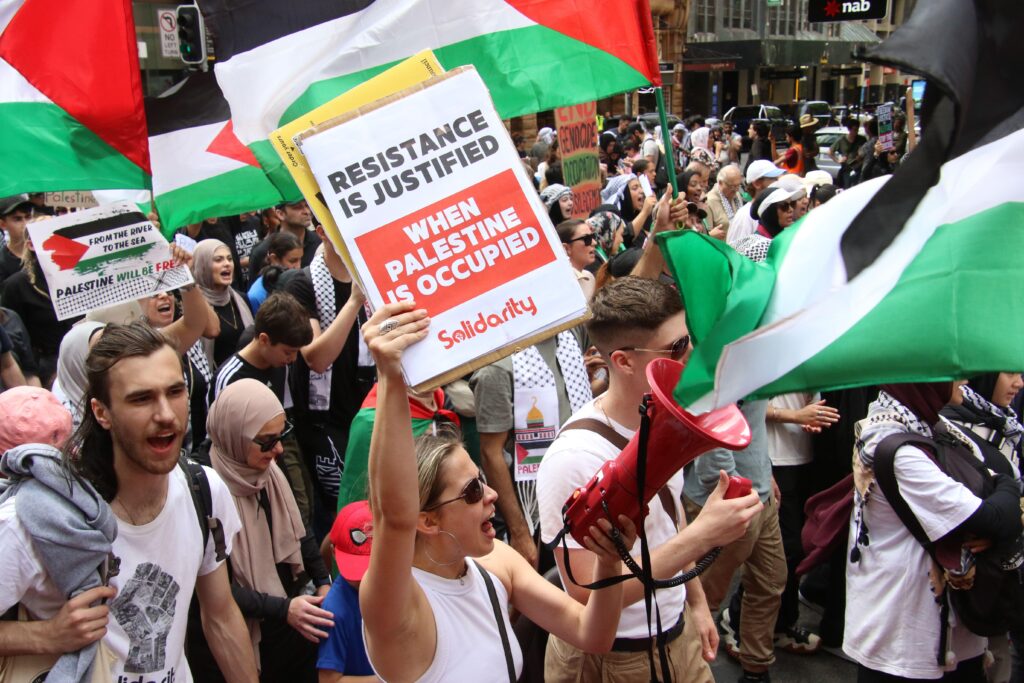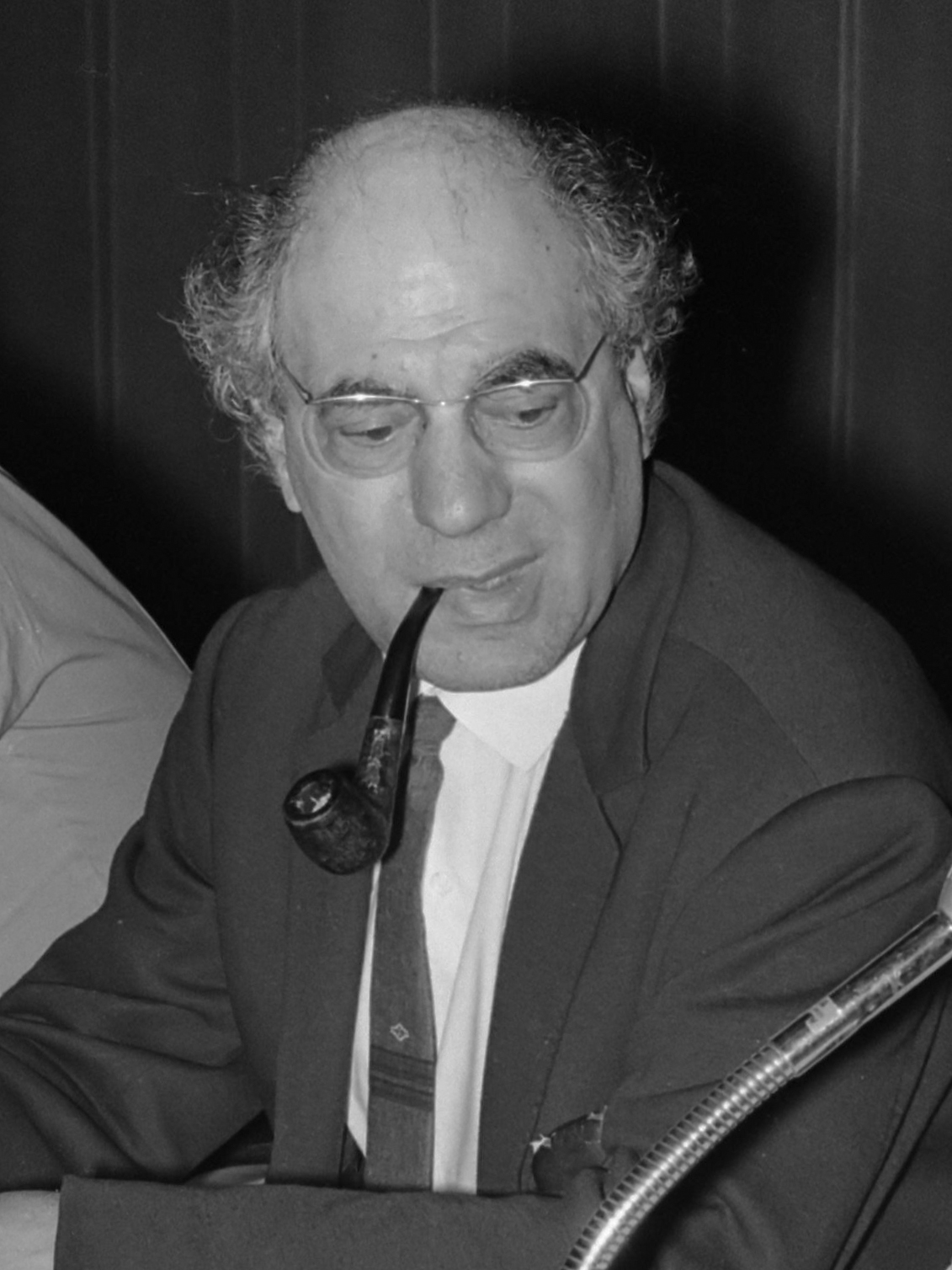Australia/Israel Review
End of “The Occupation”
Oct 21, 2024 | Dave Rich

Lessons from a year of protests
In the year since October 7, 2023, much has changed in the world of antisemitism, anti-Zionism, and the blurry zone of ideas and feelings where the two meet and interact.
We can count the hate crimes and look in horror at the shameless return of medieval anti-Jewish tropes, but perhaps more significant is the shift in the language of the anti-Israel movement from occupation to colonialism, and the associated change in its focus from reversing Israel’s conquests in 1967 to erasing its foundation in 1948.
This has brought with it a radicalisation of intent, from campaigning to remove the Israeli presence from the West Bank and Gaza to calling for it to be removed from the Middle East entirely. Most troubling of all, it is accompanied by a hostile attempt to rewrite Jewish history.
The change is audible in the chants: “We don’t want two states, we want 1948” is the most explicit, putting this movement at odds with the settled position of Western governments, the international community, and the United Nations. It’s visible in the academics’ letters that were penned as soon as Hamas smashed though Israel’s border fence on that terrible October morning. It is implied in every social media post that rails against 76 years of settler colonialism, rather than 57 years of occupation. And it is tangible as the emotional driving force of this movement, which is in no mood for compromise.
Indeed, it is difficult to find any prominent pro-Palestinian activist in the mainstream of this movement who is still campaigning “only” against the occupation of 1967. When people do talk about this it seems almost quaint; like the politics of a bygone age.
There are several factors that explain why this has happened, and various reasons why it is such a problem.

French intellectual Maxime Rodinson in 1970 (Image: Wikipedia)
The argument that Israel is a settler colonial state has been around for a long time. It was a staple of Soviet and Arab propaganda from at least the 1960s onwards, and by the 1970s it had started to become commonplace in radical left-wing thinking. One of the most influential books on the subject was Israel: A Colonial-Settler State?, written by French Jewish Marxist and Middle East expert Maxime Rodinson and first published in English in 1973. Rodinson pointed out that the Zionist movement had cooperated extensively with European colonial powers, which, he wrote, was unremarkable at the time given the ubiquity of colonial thinking and practice, even amongst socialists. He argued that it was inevitable now, in a period of anti-colonial politics, that Zionism’s colonial practices would bring into question Israel’s existence as a state.
This has found new resonance in today’s anti-racist politics, which blends together colonialism, racism and white supremacy as the great evils of the modern world. One legacy of the “Black Lives Matter” movement is that progressive politics tends to view, and explain, everything through that lens. If you believe that every significant problem in society is due to the pernicious impact of structural racism and white supremacy, then on a global level its equivalent is colonialism and the legacy of Western conquest and domination. So much easier and more satisfying to assume that the problem of Israel and Palestine fits this framing, than to do the hard work of understanding its distinctive features and coming up with an analysis that actually fits the facts.
Because colonialism is now seen not as a historical feature but as an unforgiveable moral sin, any product of colonialism – which in this thinking includes the State of Israel – can never be accepted as legitimate. You cannot compromise with racism, after all. Just as the old campaigns against the occupation implied that Israel would remain within its pre-1967 borders, so the switch in the anti-Israel movement from anti-occupation to decolonisation implies that anything short of erasing Israel and replacing it entirely with Palestine would be an injustice.
This is not inevitable. Ironically, Rodinson himself did not go along with the idea that Israel’s creation should be reversed, even though it was his own work that would lay the foundation of this view today. By 1975, he was arguing that whatever the colonial circumstances of its creation, Israeli Jews had by then formed a nation and needed “some political structure through which they can defend themselves as a group, their interests and their aspirations.” He also dismissed the self-righteous condemnation of Zionists found on parts of the left, writing:
Colonists and colonisers are not monsters with human faces whose behavior defies rational explanation, as one might think from reading left-wing intellectuals… Belonging to a colonising group is not the unspeakable and unpardonable crime it is thought to be in cafes along Saint-Germain and Saint-Michel boulevards. Who is innocent of this charge? The only variable lies in the time that has elapsed since the usurping was done. The human conscience sooner or later accepts the idea that long-time use establishes a valid claim.
Rodinson would probably get cancelled for writing this nowadays.
By shaping their campaigning in a way that challenges Israel’s very existence – sometimes explicitly so – Western pro-Palestine activists have conveniently brought their solidarity movement into line with the actual campaign against Israel in the Middle East.
On the ground where it matters, in the place where the real action occurs and the outcome of this struggle will be determined, the campaign against Israel is led by Hamas, Hezbollah, the Houthis, and behind them Iran. Those groups are not interested in a two-state solution or in merely recovering the territories conquered by Israel in the Six-Day War of 1967: they want Israel gone for good and are happy to say so. It would be pointless for the solidarity movement expending all that energy on the streets and campuses of Western cities to do so in support of a goal that was completely different from that pursued by the sharp end of this movement in Palestine itself. The leaders of Hamas and the Islamic Republic of Iran recognise this, even if those Western campaigners don’t realise it themselves.
In that respect, it is striking that just as the Palestine Authority, which officially supports two states and does not back a full boycott of Israel, is a relatively powerless onlooker in the struggle between Israel and Hamas, so the representatives of the Authority in the West are similarly marginal in the protest movement here. The Head of the Palestinian Mission to the UK, Husam Zomlot, speaks at rallies and is interviewed on the news, but his office is not an official organiser of the marches, nor does he set its slogans and goals. Instead, the defining slogan of this protest movement – ‘From the River to the Sea, Palestine Will Be Free’ – appears almost word for word in Hamas’ official policy document of 2017 (which is regularly, but wrongly, referred to as an updated Charter).
The narrative that Israel is simply an invention of modern colonialism, dreamed up by Victorian imperialists in the backrooms of Whitehall, inevitably involves an effort to re-write Jewish history – and this is where it becomes much more troubling, because it encourages the denial that there ever was a Jewish connection to the land of Israel, either in ancient times or through to the modern period.
“Europeans wanted to bring the Jews here to preserve their interests in the region… Israel is a colonial project that has nothing to do with Jews”, said Palestinian President Mahmoud Abbas, quite wrongly, in 2018. The argument that Israel is a European implant in the Middle East implies that all Israelis are white Europeans, erasing the experiences of hundreds of thousands of Mizrahi and Maghrebi [North African] Jews who emigrated to Israel from across the Middle East and North Africa. In short, it involves the imposition onto Jews of a false account of our own history and a restrictive, unwanted definition of Jewish identity, designed to support a politics that most Jews would consider hostile, even dangerous. Whether this is the intention or not is beside the point: this is how it works in practice.
When we look back at the past year, there is much that is obviously antisemitic. Some of the justifications and excuses made for the brutality of October 7 are utterly nauseating, matched only in their disgrace by those who deny that the Hamas atrocities of that day happened at all. But I fear that more long-lasting damage will be done by this pernicious invention of a false version of Jewish history, that deliberately denies or ignores all that makes the Jews a people, as part of a project to reverse the single greatest political achievement of the Jewish people in the post-Shoah (Holocaust) years. Those who wish to remove the Jewish state from the world seek to do so by first erasing the Jewish people from history. And this, ultimately, is the deepest antisemitism of all.
Dr Dave Rich is Director of Policy at the UK’s Community Security Trust and author of Everyday Hate: How Antisemitism Is Built into our World and How You Can Change It (Biteback Publishing, May 2023). Reprinted from “Everyday Hate”, his substack blog. © Dave Rich, reprinted by permission, all rights reserved.
Tags: Anti-Zionism, Antisemitism






